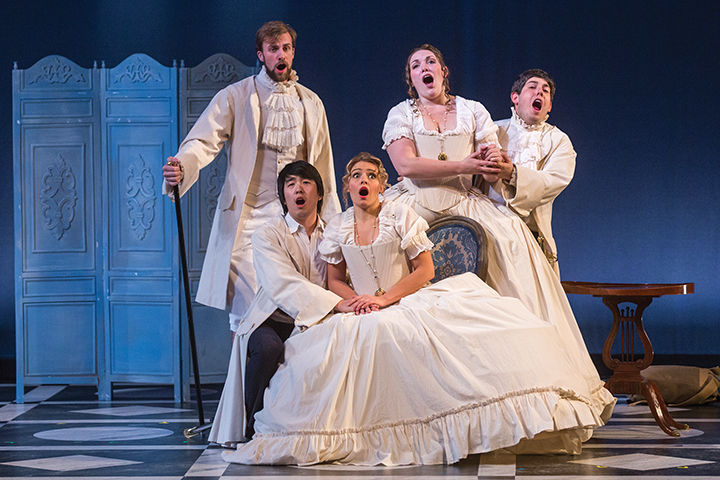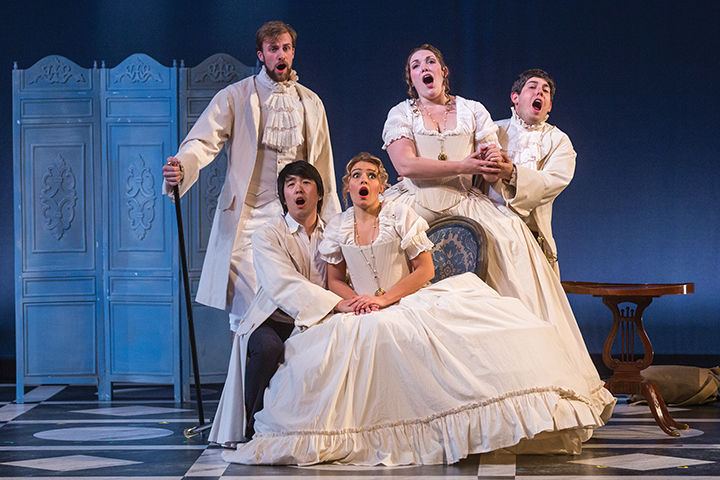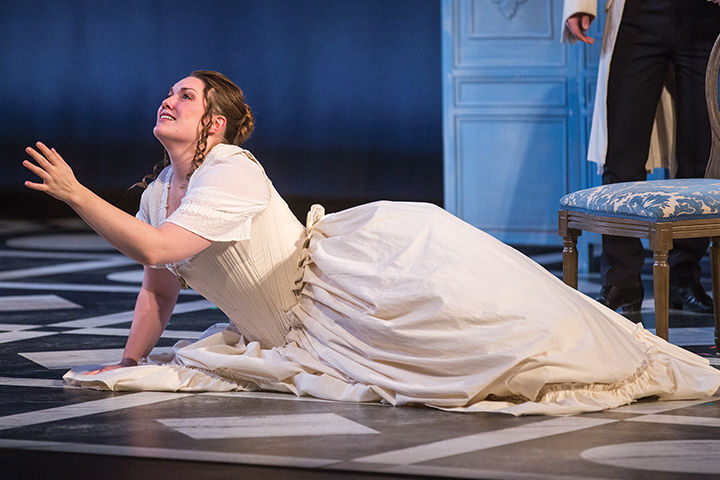The stage lights were low when the music swelled and two women dressed in white 18th-century regalia walked onstage. Their song was in Italian, but their story of trial and temptation in a lover’s absence seemed all too familiar.
This is the third time that the Maryland Opera Studio, a two-year graduate program in the music school, is producing Così fan tutte. The piece is one of Mozart’s three Da Ponte operas and what Nick Olcott, director of Così fan tutte, calls “one of the most produced operas in the world.”
“It is an opera that we have done a lot because it’s so good for young singers,” he said. “To learn these roles, they will have the chance to sing them again in their careers.”
The production is the students’ first time playing a full-length role in an operatic setting. It is staged as a “white opera,” meaning devoid of all the pomp and grandeur typically associated with the art form. The stripped-down Così features minimal setting with minimal props — a few chairs, a sword or a necklace. The costumes are of period, and as fancy as one would expect, but composed completely from white tones.
“We don’t have the maximum amount of scenery because the idea is to have the singers focus on their character work and telling the story through really detailed decisions they’ve made as an actor,” said Craig Kier, the studio’s director and the Così fan tutte conductor. “That’s one of the things we really focus on at the Maryland Opera Studio: stage craft.”
The graduate students spent the last year in private coaching sessions taking vocal lessons, diction lessons and many acting classes. They do scene performances and, at the end of the year, a new work read, but nothing full-length until their third semester.
The singers complete in-depth work with the libretto, or text, of the opera. They analyze not only the literal meaning of the 18th century Italian, but also the grammar and the intention.
“We started in the summer, going through the score and translating it,” said Teresa Hitchcock, a graduate student who plays Fiordiligi in Così fan tutte. “We took every piece and said it in English and said it in Italian.”
Olcott, who has been directing opera for more than 20 years, stressed the need for operatic artists to be comfortable working in unfamiliar languages. This is his seventh time directing Così.
“One time I did a Russian work. That was really challenging,” he said.
The studio is presenting Così fan tutte in its original Italian, but the work can transcend time and language, Olcott said.
“I’ve set it in the 1940s. I’ve set it in Hollywood in 1929. This one we’re setting in Italy in the 18th century as it was written, but it is a piece that doesn’t require a great deal of historical research because it’s basically a story of love,” he said.
The opera deals with two sisters, Fiordiligi and Dorabella, whose lovers, Ferrando and Guglielmo, decide to engage in a bet with their friend Don Alfonso that tests the girls’ fidelity. It was considered a scandal for its immorality when it opened in 1790.
“No less a critic than Beethoven said the opera was the one blot on Mozart’s entire career,” Olcott said. “Even Wagner said the story was so silly that it caused Mozart to write inferior music, which I think most critics today would heartily disagree with.”
The story is no less controversial today as it was then, but for vastly different reasons. Literally translated, “Così fan tutte” means “how all women act.” The opera can come off as a sexist portrayal of a woman’s position in a relationship, but at the same time, the foolish behavior of both male and female characters hints that neither gender has the upper hand. A cynical and witty character, Despina, the sisters’ maid, is a surprisingly modern voice of reason who seems to echo some of the sentiments that feminist voices today so often scream into the patriarchal void.

Cosi fan tutte
Prior to Monday’s performance, the studio is holding a discussion in conjunction with the university’s women’s studies department. Titled “How all women act? #yesallwomen,” the conversation seeks to explore whether Mozart’s concepts are chauvinist or chivalrous. The opera’s modern ties reflect a thematic trend that’s not necessarily isolated.
“Our goal in having this discussion is to explore those themes to make certain that people understand that there have been for years artistic statements about the importance of equality,” Kier said.
“I get so frustrated with people who think opera is some reserved art form different from all the others. They say, ‘I saw one opera once and I didn’t like it, so I never went back,’” Olcott said. “I’ve never met anyone who said, ‘I went to one movie and didn’t like it and never went back.’”
He added: “There are good movies and bad movies, good operas and bad operas. But its just another storytelling device we’ve invented to talk about what it means to be human.”
Così fan tutte opens today in the Kay Theatre at the Clarice Smith Performing Arts Center. Tickets are on sale at theclarice.umd.edu.





